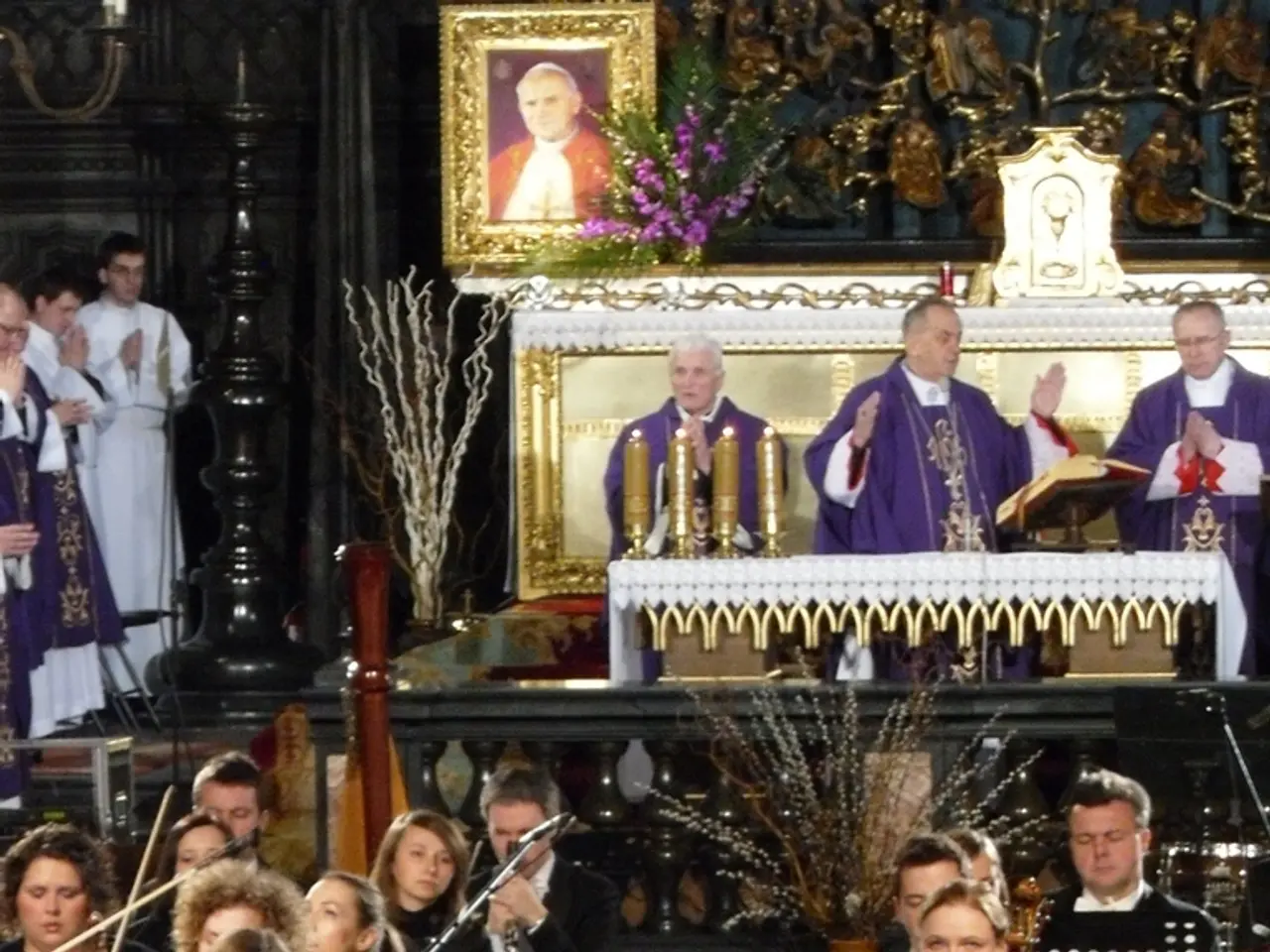Advancements in Studies and Academic Gatherings Expand Insights into the Realm of Jewish Music in the United States
==================================================================
In the realm of American Jewish Music, graduate student researchers Ray Ace and Kacie Morgan have made significant strides in uncovering the rich history and connections between influential composers.
Ray Ace, supported by a University of California Humanities Research Initiative Grant, delved into the Sinai Temple Archive, a small, attic-like space in Los Angeles, to focus on the contributions of composer Max Helfman. The archive, filled with handwritten sheet music and compositions, provided a wealth of material for Ray's research. He spent several weeks analysing the archives, documenting and photographing Helfman's works, and compiling a large list of his compositions, some of which are only available in the Temple Archive.
Kacie Morgan, meanwhile, used Python for text analysis in her research, resulting in a list of over 8,000 'people'. Interestingly, Rosh Hashanah was initially identified as the most talked-about 'person' in the oral histories due to a computer misunderstanding. However, Morgan's research provided important information for future research in American Jewish Music, offering insights into the interrelationships of composers across generations.
One such composer is Max Helfman, who worked at Sinai Temple alongside giants of the field. A concert featuring Helfman's music is scheduled to take place at Sinai Temple in the spring of 2019, co-sponsored by the Milken Fund. Many pieces will receive their first public performance at this concert.
The symposium, The Second International Symposium of the Arts of Performance and Jewishness, held in Buenos Aires, Argentina, was a collaborative effort between the Universidad of Buenos Aires, UCLA, Hebrew University of Jerusalem, and the Universidad Nacional de Tres de Febrero. Israeli musicologist Edwin Seroussi delivered the keynote address at the symposium, which focused on the academic study of the arts from an interdisciplinary perspective.
Throughout history, American Jewish music has been shaped by a diverse group of composers who have brought their unique perspectives and cultural influences to the art form. Among them are Ernest Bloch, Leonard Bernstein, Abraham Zevi Idelsohn, and contemporary figure Cantor Jonathan Comisar.
Ernest Bloch, a Swiss-born American composer, deeply reflected Jewish cultural and liturgical themes alongside European post-Romantic traditions in his works. After emigrating to the U.S. in 1916 and becoming a citizen in 1924, he taught at major institutions such as the Cleveland Institute of Music and Berkeley.
Leonard Bernstein, a second-generation American composer and conductor, was pivotal in blending classical, Jewish, and popular music. He drew on his Jewish heritage in works like Symphony No. 3, “Kaddish” and Chichester Psalms, while also achieving fame in musical theater with West Side Story.
Abraham Zevi Idelsohn, born in Latvia and later active in Jerusalem, was foundational in Jewish musicology and ethnomusicology. He systematically collected and studied Jewish liturgical music traditions from diverse communities globally, showing the underlying unity and richness of Jewish musical heritage.
Cantor Jonathan Comisar represents contemporary American Jewish music, combining sacred themes with bold, genre-crossing compositions. His compositions, like Chalom (Dream) and To Bigotry No Sanction, illuminate music's role in addressing contemporary Jewish identity and social justice issues.
These composers share common lessons in balancing heritage with innovation, using music as a vessel for cultural memory and social engagement, and adapting Jewish musical traditions within the American artistic landscape. Their personal stories range from immigration and cultural preservation (Bloch, Idelsohn) to fusion of genres and activism (Bernstein, Comisar), illustrating the rich, multigenerational tapestry of American Jewish music.
References:
- Ernest Bloch - Jewish Virtual Library
- Aaron Copland - Jewish Virtual Library
- Leonard Bernstein - Jewish Virtual Library
- Abraham Zevi Idelsohn - Jewish Virtual Library
- Cantor Jonathan Comisar - Jewish Music Forum
"Kacie Morgan might find it interesting to explore the connections between composers in the context of entertainment, particularly the use of music in their works, as she delves deeper into American Jewish Music."
"The upcoming concert featuring Max Helfman's music at Sinai Temple in the spring of 2019 will not only entertain but also offer insights into the history of American Jewish Music, making it an enticing event for both music enthusiasts and those interested in the field's development."






